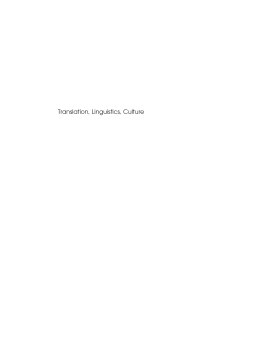
Additional Information
Book Details
Abstract
This book takes a linguistic approach to translation issues, looking first at the structural view of language that explains the difficulty of translation and at theories of cultural non-equivalence. A subsequent chapter on text types, readership and the translator's role completes the theoretical framework. The linguistic levels of analysis are then discussed in ascending order, from morpheme up to sentence, while a summarising chapter considers various translation types and strategies, again considered in relation to text type, author and reader.
Nigel Armstrong researches French linguistics and translation in the University of Leeds, UK. Linguistic research focuses on social and regional linguistic variation in France, while projects in a translation perspective apply the study of variation to how language is used in popular culture: films and animated cartoons, for example.
Table of Contents
| Section Title | Page | Action | Price |
|---|---|---|---|
| Contents | v | ||
| Acknowledgements | viii | ||
| Abbreviations | ix | ||
| Chapter 1 The Linguistic Bases of Translation | 1 | ||
| Chapter 2 Approaching a Text | 22 | ||
| Chapter 3 Translation Issues at the Word Level | 49 | ||
| Chapter 4 Words in Combination | 82 | ||
| Chapter 5 Translation Issues at the Syntactic Level | 111 | ||
| Chapter 6 Translation Types and Procedures | 142 | ||
| Chapter 7 Some Miscellaneous Issues | 183 | ||
| References | 214 |
